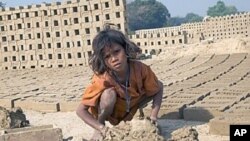An immigrant farm worker in the United States, endlessly trying to pay off the man who smuggled him into the country; a young girl in a Nepalese brothel; a child-servant in Haiti: the faces of the victims of human trafficking are diverse, but the world and the United States are beginning to understand them better.
Ambassador-at-Large Luis CdeBaca leads the U.S. fight to combat forms of slavery abroad. He notes that the U.S. and other countries have come to see that trafficking can be a domestic challenge as much as a transnational one. There is increased attention to the issue of trafficking victims within America, particularly prostituted minors. This is reflected in the fact that the State Department now includes the United States in its annual Trafficking in Persons report:
"What we've seen is that trafficking victims are from everywhere. Many of them have never been moved out of their own country. . . .We needed to look at the United States as well, and see, what's happening to Americans who are victimized by this crime. So what we're hoping is that as we do that, we will sharpen best practices and really be able to figure out, what are the service needs of this particular type of population."
Throughout the next year, the Interagency Task Force to Combat Human Trafficking will talk about ways to strengthen victims' service programs at the federal and state government level, including civil society and the corporate sector. Through enhanced training and agency cooperation the U.S. government hopes to create a better path to freedom for persons from any country who find themselves exploited in the U.S. U.S. government agencies will be working more closely together to share information and catch and prosecute traffickers who work domestically and internationally.
"For all the millions who are held in servitude, fewer than 50,000 have been officially identified as victims," said U.S. Secretary of State Hillary Clinton. "Too many others are either ignored, or even worse, treated as criminals. So we need to do more to identify the true victims of human trafficking and help restore them to participation in our society."
"What we've seen is that trafficking victims are from everywhere. Many of them have never been moved out of their own country."






















